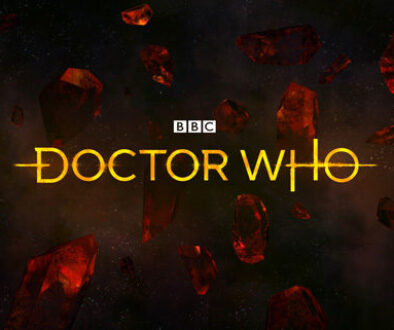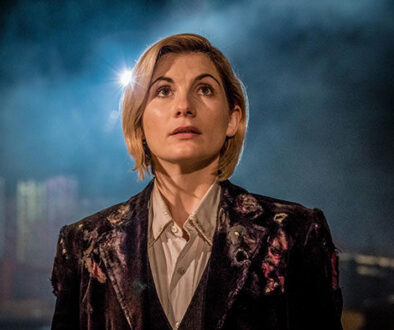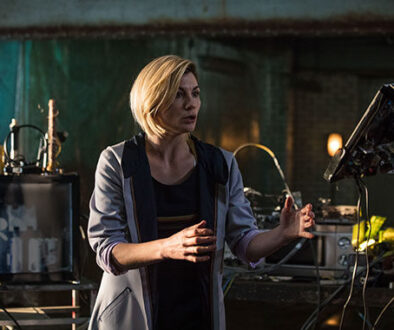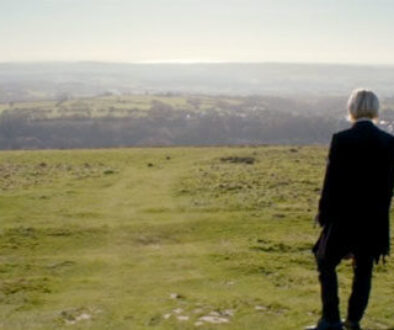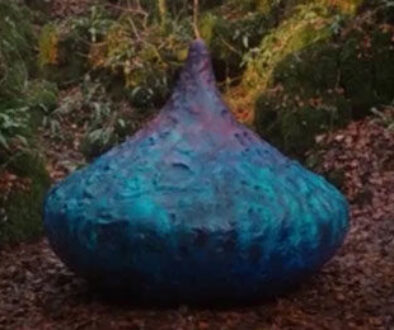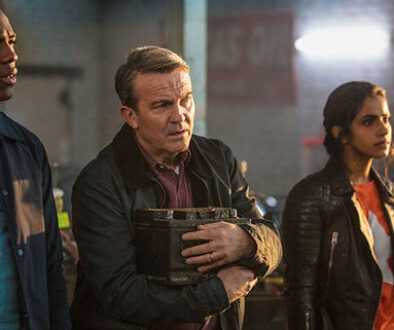2nd Opinion: “The Woman Who Fell To Earth”
Connor Johnston & Gustaff Behr give their takes on the first episode of Series 11.
Connor’s View – “A Time For Heroes”
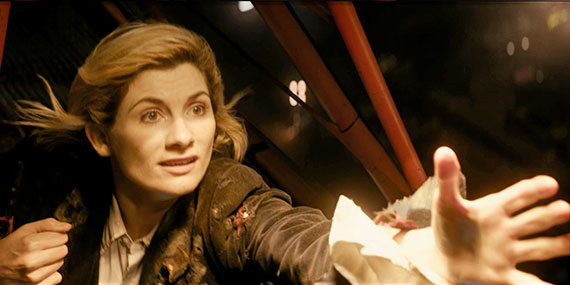
“There’s this moment when you’re sure you’re about to die, and then… you’re born”
New and Old. Past and Future. Life and Death. Nothing on television even comes close to allowing these polarising concepts to be as flexible and complimentary in the way Doctor Who does – and never is this more evident than in a new Doctor’s first episode.
The concept of Regeneration originates from a bid to reject the idea that an ending can’t be a beginning, that something entirely different can’t simultaneously embody the core similarities of its predecessor. “The Woman Who Fell to Earth” continues that rejection beautifully in being the product of striking changes both in front of and behind the camera, but still feeling irresistibly like the show audiences have been enchanted by since day one.
Chris Chibnall’s script flaunts an understanding that an episode of Doctor Who doesn’t always need to meet an overly specific criterion. It doesn’t always need a TARDIS, it doesn’t need constant references to the past, it doesn’t need Outer Space… and it doesn’t even need a male actor in the titular role. All it needs is what’s found in Jodie Whittaker’s performance: It needs a hero.
And our hero, she is. From the moment she crashes through the roof of a train to accidentally abandoning herself in the vacuum of space; Whittaker embodies all the quintessential qualities of the Doctor that are so familiar to us. She’s passionate, full of energy, values the beauty in each and every life and is charmingly indomitable in the face of danger. Of course considerations need to be made for post-regeneration related spikes in energy, however, there’s no doubt that even in the process of becoming a new person the Doctor has remained the instant point of authority in any situation she finds herself in.
Accompanying her are friends Graham, Grace, Yaz and Ryan – whom each make a distinct impression in their first hour which is a clear testament to both Chibnall’s script and the performances. Already there are clear character arcs for our continuing team; Yaz’s ambition, Ryan’s determination and Graham’s grief – each of which with enough potential to grow into something truly special in the coming weeks. What has been achieved instantly, however, is the chemistry and dynamic between the team, a clear highlight that elevates some of the episode’s slower moments. Although Grace’s journey with the Doctor is short-lived, Clarke’s portrayal of her spirit, will and thirst for adventure has no doubt cemented her in a long line of great companions that never were.
There is of course collateral when an episode has as many responsibilities as an era opener. For “The Woman Who Fell to Earth”, it is that there’s not an incredible amount of time devoted to fleshing out its antagonist. To Chibnall’s credit, there are times where “Tim Shaw” works quite well in establishing a sense of mystery, urgency and threat to the episode’s formative moments – but it does tend to waver shortly after as he opens his mouth. While partaking in a trophy hunt isn’t the most diabolical motivation for a villain, it is at least original. Sadly, no matter how many teeth he collected it seems Shaw’s bark was much more impressive than his bite.
One final point to note. Chibnall’s use of Ryan’s vlog to bookend the episode is a genius move and plays brilliantly on our new found investment in these characters. However, it’s only in further reflection that I’ve realised it serves another purpose in regards to how easy it is for the audience to substitute Ryan’s admiration for his Gran as praise for Thirteen…
Because, really, this isn’t the first time we’ve met a female Doctor.
We’re raised by them. We’re taught by them. We’re friends with them.
We’re loved by them. We’re guided by them. We’re hired by them.
We’re protected by them. We’re challenged by them. We’re inspired by them.
They are the women in our lives that we’ve always associated with the character’s heroism, kindness and resilience – only now, they finally look like her. Yes, this IS all new and different, but for Ryan and any one of us who’s had a ‘Grace’ in our lives, there’s ironically nothing less alien than a female Doctor.
Gustaff’s View – “A Mixed Bag”
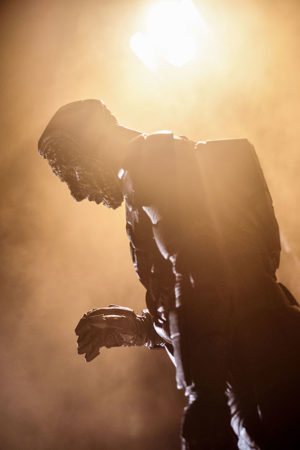 Prior to the beginning of this new era of Doctor Who, and despite what the BBC and certain fans will tell you, there were some actual reasons to be fearful of the Jodie Whitaker Era: A long hiatus between series (16 months, not counting “Twice Upon A Time”), subtle-as-a-brick-marketing, cutting episode totals (again), as well as the fact that Chris Chibnall’s past episodes generally hold some pretty low rankings, with 104th out of 144 being the highest on this very site. Whoopsie.
Prior to the beginning of this new era of Doctor Who, and despite what the BBC and certain fans will tell you, there were some actual reasons to be fearful of the Jodie Whitaker Era: A long hiatus between series (16 months, not counting “Twice Upon A Time”), subtle-as-a-brick-marketing, cutting episode totals (again), as well as the fact that Chris Chibnall’s past episodes generally hold some pretty low rankings, with 104th out of 144 being the highest on this very site. Whoopsie.
“The Woman Who Fell to Earth” is a mixed bag. The most enjoyable bit for me was the musical score which sounded completely different from what I’m used to, but in a good way. Visually the episode also looks stunning with cutting-edge special effects, brilliant camera angles and locations wonderfully utilized. The first twenty minutes feel like Doctor Who is taking cues from Torchwood’s dark and almost menacing style of storytelling, save for Ryan’s bike lesson.
Despite the above, the plot for the episode is paper thin. It’s basically “Torchwood: Moving Target” from Big Finish but with more characters added. The story opens on a good mystery but gradually evolves into a generic tale of some weird alien with a tooth fetish hunting some wimpy guy who might as well die since I’m not attached to him. Narrative wise, it would’ve made more sense to make Ryan “Tim Shaw”’s target since he was the one who touched the alien sigils that kick-starts the plot. That and we care about Ryan.
Character wise, the episode makes good use of the amount at its command, giving us brief showcases of who everybody is, even if they aren’t all interesting. I liked Yaz better the first time I saw her in 1960s in Big Finish’s “The Red Lady” when she was called Helen Sinclair. Seems she’s had a career and race change. Yaz comes across as over eager and annoyed at being kept back by others, while Graham feels like a discount Wilfred Mott, except without the whimsical humour that made that character so lovable. Graham’s wife Grace is much more likable, to the extent I wished she had lived and he died. She has an infectious, adventurous spirit and embodies perhaps accidentally the correct way to portray recklessness, a characteristic that was supposed to serve as Clara’s fatal flaw, but never felt more than an informed ability. Here Grace goes against the Doctor’s wishes, prepared to do something she isn’t sure will work, whilst refusing to listen to genuinely good advice and dies because of it.
Ryan is by far the most developed character here with his dyspraxia. I’m most interested to see how the series explores his disability and whether it will continue to hinder him on his travels with the Doctor, or whether it will simply be shown once (as it is here) before being regulated to an informed disability.
Jodie’s Doctor is another mixed bag for me. There is nothing wrong with her portrayal of the Doctor, save for some cringy moments trying to masquerade as levity (the nose, the tongue and ‘friends’), but much like Peter Capaldi, Christopher Eccelston and Jon Pertwee, I didn’t develop any sort of emotional connection to her incarnation for the entire length of her first episode. I didn’t smile, frown or really care what happened to her. This can still change over the course of the season.
After months of trying to work out how the Doctor would escape such an inescapable predicament, Chibnall shows us just how creative a writer he is by…not doing that. The Doctor just falls out of orbit onto the ground, gets up like it’s nothing and continues on her merry way. These continued plummets from high altitudes with little to no consequences really cheapen the Doctor’s fall from the Pharos Telescope which was several hundred feet off the ground.
More tellingly, this move shows that Chibnall didn’t really have a plan and only wrote in that scene to distract the audience and the Doctor from properly acknowledging the gender flip. After months of centring on the gender change in interviews, the show sticks its head in the sand by refusing to do a proper acknowledgement of it within the narrative of the show, even if it’s just for comedic purposes.



